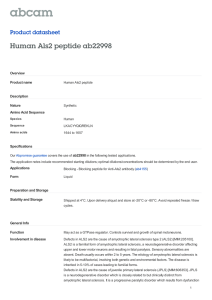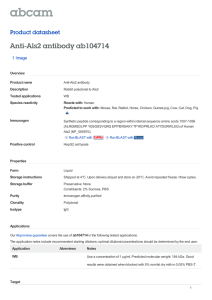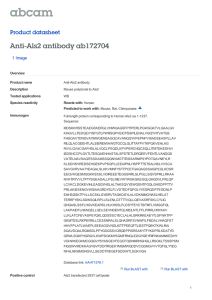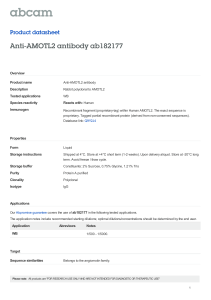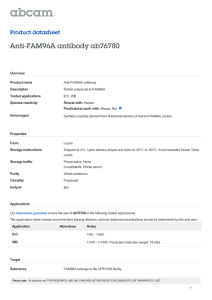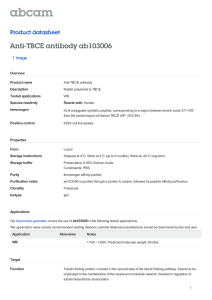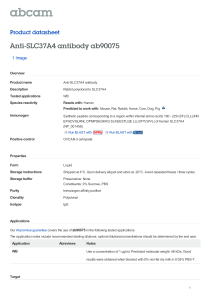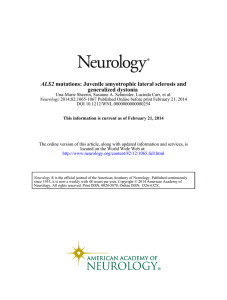Anti-Als2 antibody ab123515 Product datasheet 1 Image
advertisement
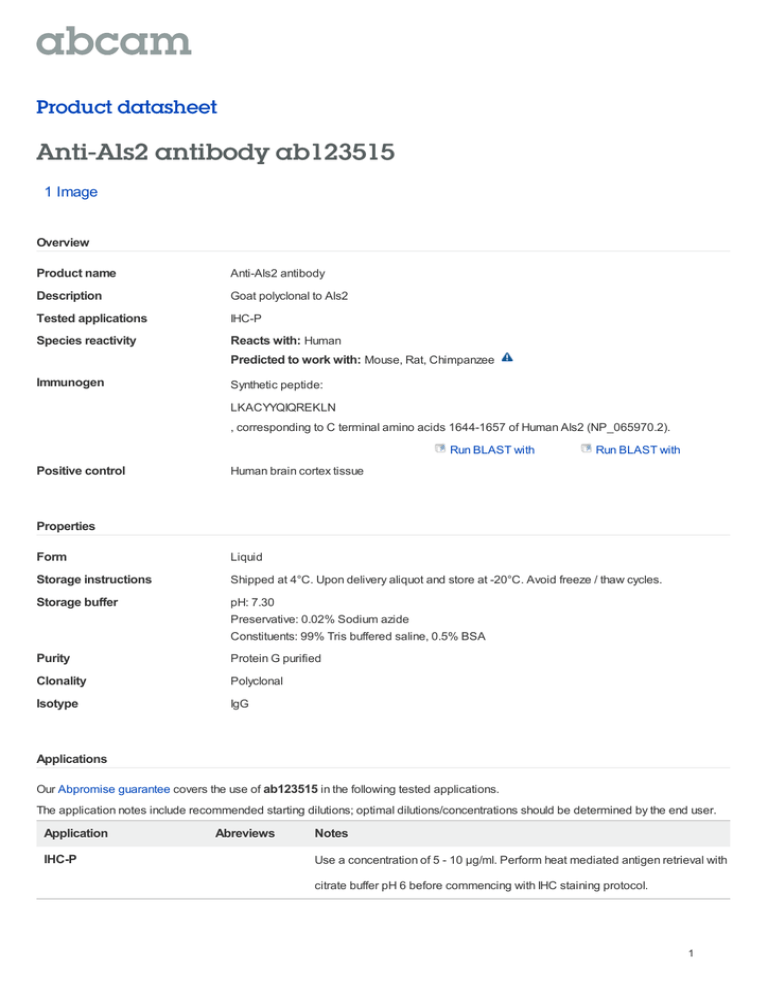
Product datasheet Anti-Als2 antibody ab123515 1 Image Overview Product name Anti-Als2 antibody Description Goat polyclonal to Als2 Tested applications IHC-P Species reactivity Reacts with: Human Predicted to work with: Mouse, Rat, Chimpanzee Immunogen Synthetic peptide: LKACYYQIQREKLN , corresponding to C terminal amino acids 1644-1657 of Human Als2 (NP_065970.2). Run BLAST with Positive control Run BLAST with Human brain cortex tissue Properties Form Liquid Storage instructions Shipped at 4°C. Upon delivery aliquot and store at -20°C. Avoid freeze / thaw cycles. Storage buffer pH: 7.30 Preservative: 0.02% Sodium azide Constituents: 99% Tris buffered saline, 0.5% BSA Purity Protein G purified Clonality Polyclonal Isotype IgG Applications Our Abpromise guarantee covers the use of ab123515 in the following tested applications. The application notes include recommended starting dilutions; optimal dilutions/concentrations should be determined by the end user. Application IHC-P Abreviews Notes Use a concentration of 5 - 10 µg/ml. Perform heat mediated antigen retrieval with citrate buffer pH 6 before commencing with IHC staining protocol. 1 Target Function May act as a GTPase regulator. Controls survival and growth of spinal motoneurons. Involvement in disease Defects in ALS2 are the cause of amyotrophic lateral sclerosis type 2 (ALS2) [MIM:205100]. ALS2 is a familial form of amyotrophic lateral sclerosis, a neurodegenerative disorder affecting upper and lower motor neurons and resulting in fatal paralysis. Sensory abnormalities are absent. Death usually occurs within 2 to 5 years. The etiology of amyotrophic lateral sclerosis is likely to be multifactorial, involving both genetic and environmental factors. The disease is inherited in 5-10% of cases leading to familial forms. Defects in ALS2 are the cause of juvenile primary lateral sclerosis (JPLS) [MIM:606353]. JPLS is a neurodegenerative disorder which is closely related to but clinically distinct from amyotrophic lateral sclerosis. It is a progressive paralytic disorder which results from dysfunction of the upper motor neurons of the motor cortex while the lower neurons are unaffected. Defects in ALS2 are the cause of infantile-onset ascending spastic paralysis (IAHSP) [MIM:607225]. IAHSP is characterized by progressive spasticity and weakness of limbs. Sequence similarities Contains 1 DH (DBL-homology) domain. Contains 8 MORN repeats. Contains 1 PH domain. Contains 5 RCC1 repeats. Contains 1 VPS9 domain. Post-translational modifications Phosphorylated upon DNA damage, probably by ATM or ATR. Anti-Als2 antibody images ab123515, at 5 µg/ml, staining Als2 in formalin fixed, paraffin embedded Human brain cortex tissue by Immunohistochemistry. Immunohistochemistry (Formalin/PFA-fixed paraffin-embedded sections) - Anti-Als2 antibody (ab123515) Please note: All products are "FOR RESEARCH USE ONLY AND ARE NOT INTENDED FOR DIAGNOSTIC OR THERAPEUTIC USE" Our Abpromise to you: Quality guaranteed and expert technical support Replacement or refund for products not performing as stated on the datasheet Valid for 12 months from date of delivery Response to your inquiry within 24 hours We provide support in Chinese, English, French, German, Japanese and Spanish Extensive multi-media technical resources to help you We investigate all quality concerns to ensure our products perform to the highest standards 2 If the product does not perform as described on this datasheet, we will offer a refund or replacement. For full details of the Abpromise, please visit http://www.abcam.com/abpromise or contact our technical team. Terms and conditions Guarantee only valid for products bought direct from Abcam or one of our authorized distributors 3
